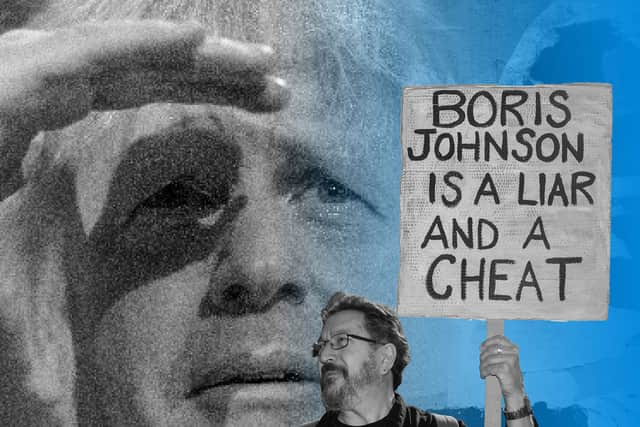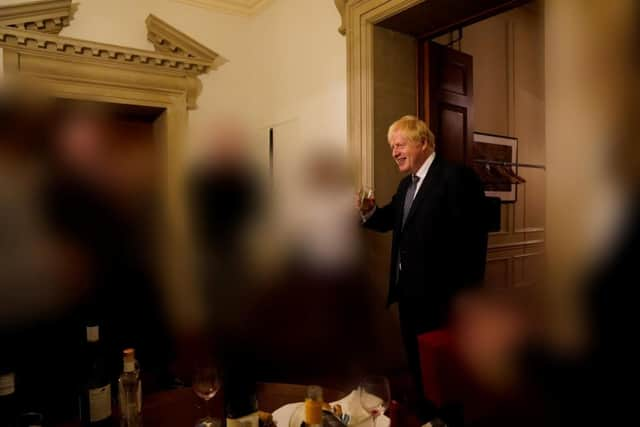Boris Johnson: is the partygate inquiry the end of the former Prime Minister’s political career?
This article contains affiliate links. We may earn a small commission on items purchased through this article, but that does not affect our editorial judgement.
and live on Freeview channel 276
Boris Johnson is certainly no stranger to the spotlight. He’s been on the front cover of countless newspapers in his time, both good and bad, and always seems to bounce back from the brink in his own idiosynratic way. But the latest scandal he is at the centre of seems to have shaken him far more than those in the past.
On Wednesday (22 March), the former Prime Minister faced an intense grilling at the hands of the Privileges Committee, which has been tasked with deciding whether he misled Parliament over the so-called ‘partygate scandal’.
Advertisement
Hide AdAdvertisement
Hide AdWhen he was still in office, Johnson repeatedly told the House of Commons that no rules or guidance had been broken at Number 10 - something which was later proved untrue by several newspapers, a Metropolitan Police investigation, and civil servant Sue Gray’s report, which had been commissioned by the Uxbridge and South Ruislip MP himself.
So the task at hand for Johnson was to convince the Privileges Committee that he did not intend to mislead Parliament. He made this point pretty much as soon as he could, declaring in his opening statement: “I’m here to say to you hand on heart that I did not lie to the House. When those statements were made, they were made in good faith and on the basis on what I honestly knew and believed at the time.”
Essentially, the ex-Prime Minister’s argument was this: he did not believe any rules had been broken at Number 10, and so was telling the truth - or rather, his truth - when he proclaimed to Parliament that “the guidance and rules were followed at all times”.


Given the photographs we’ve all seen of Johnson - where he is beside people who aren’t social distancing, or standing near bottles of alcohol - many members of the public will, naturally, find this difficult to believe. The MPs on the Privileges Committee appeared unconvinced too, insisting to Johnson that lockdown breaches should have been “obvious” to him.
Advertisement
Hide AdAdvertisement
Hide AdJohnson nevertheless remained pretty defiant in his defence, which in some ways, consisted of him arguing that he was stupid enough to not realise rules were being broken. However, what did change throughout the hearing was how confident he seemed answering questions.
He began the session pretty sure of himself, insisting the committee had found “nothing” that proved he had lied. But as the interrogation went on, the former Prime Minister, usually so comfortable in the hot seat, became increasingly and more visibly rattled.
The MP was forced to rely on the same arguments again and again - that all the gatherings he attended were work-related, and that even if some of these were leaving events, they were “essential” for work purposes. “I will believe until the day I die,” Johnson remarked, “that it was my job to thank staff for what they had done, especially during a crisis like Covid, which kept coming back, which seemed to have no end, and where people’s morale did, I’m afraid, begin to sink.”
He tried to argue that Downing Street, as a “cramped” 18th century townhouse, was a difficult building to social distance in - and that while staff tried to “give way to each other” on the stairs and give each other “wide berths” in corridors, it was “impossible” to maintain a two-metre distance at all times when they “had no choice but to meet day in, day out, seven days a week, in an unrelenting battle against Covid”.
Advertisement
Hide AdAdvertisement
Hide Ad

But the Privileges Committee was always poised and ready to strike. “Were bottles of alcohol strictly necessary for a work event?” SNP MP Allan Dorans asked the ex-Prime Minister. “It is customary to say farewell to people in this country with a toast,” Johnson suggested.
“Did you think, Mr Johnson, that exceptions applied in Number 10 to workplace rules and social distancing guidelines that didn’t apply to the hospitals and the care homes?” said Labour MP Yvonne Fovargue. Things became particularly tense at these moments, and Johnson scrambled through answers: “Of course not.”
The former Prime Minister’s replies got particularly far-fetched when he suggested he would have told the public - standing at the podium which said “stay at home, protect the NHS, save lives” - that they could have leaving drinks for colleagues. Old tweets show that the government told members of the public they couldn’t have a work Christmas lunch or party at that time.
Johnson seemed to get most upset in the moments when he considered what the public thought of him. “It seems to be the view of the committee and sadly many members of the public,” he said, “that [these pictures] show me attending rule-breaking parties where no one was socially distancing. They show nothing of the kind.”
Advertisement
Hide AdAdvertisement
Hide AdHe also lost his composure on several occasions, raising his voice or calling suggestions made by the Privileges Committee “nonsense”. The ex-Prime Minister was at his most emphatic when he was declaring that anyone who claimed there was “partying in lockdown” in Number 10 “simply does not know what they are talking about.”
Johnson’s performance at the hearing aside, the question that really remains is what does this all mean for his political future? Since his departure from Downing Street, there have been frequently circulated whispers of a comeback - often played on by the MP himself, who has used a series of classical and pop culture allusions to suggest he’s making a grand return.
But this might actually be the nail in the coffin for Johnson. He’s got his staunch supporters, for sure. The former Prime Minister was greeted with a few cheers when he entered the hearing room on Wednesday (22 March), and to no one’s surprise, Jacob Rees-Mogg was tweeting his support: “Boris is doing very well against the marsupials.”
However, there were other signs that suggested support for Johnson, who has long been able to call on the cavalry whenever needed, is beginning to wane. In the middle of the hearing, MPs were called to vote on Rishi Sunak’s Brexit deal for Northern Ireland - one which Johnson had publicly said he would be voting against. But the new Prime Minister’s agreement passed with flying colours at 515 to 29, with Johnson, as well as his successor Liz Truss, apparently struggling to sway colleagues to their side.
Advertisement
Hide AdAdvertisement
Hide Ad“I think he’s done,” one senior figure told Politico’s Playbook. “But it wasn’t the committee that did it for him — it was the vote on the Windsor Framework. It was the fact he went out on a limb and no-one rallied to his cause.”
There was also talk of there being a multitude of Johnson supporters waiting in the lobby to brief journalists after the hearing, but in the end only Brendan Clarke-Smith, a long-standing ally, was left to fight for him.


There is also of course the question of what the public thinks of Johnson, as it’s public support which wins elections. Here’s the thing: there are those who have always hated him, and there are those who have always loved him. That probably will never change.
But for those who didn’t have such extreme views initially, there’s just no escaping from the fact that the partygate saga was so deeply disappointing - and felt so deeply unjust - that there’s no recovery to be made. So while Johnson claimed the hearing was going to vindicate him, it did nothing of the sort. I doubt anyone’s opinion really changed.
Advertisement
Hide AdAdvertisement
Hide AdYes, he spoke with conviction. He seemed to genuinely believe what he was saying. But we all know he’s a good public speaker. We all know he’s exceptionally good at reeling people in. I just don’t think anyone’s getting fooled anymore.
His arguments were, in simple terms, unconvincing. It’s easy for things to get blurry now, three years on from the pandemic, but if you take yourself back - things were clear. No one thought a leaving do was within the rules. No one thought a small building was an excuse for not social distancing. Imagine if we had known at the time that the Prime Minister - the one making the rules - had been unclear on them?
A Tory polling expert has already given a damning verdict for Johnson. Lord Hayward, the Conservative peer and elections guru, told The Times that if a by-election was held now - the “worst-case scenario” the MP’s allies are apparently preparing for - the former Prime Minister would lose his seat to Labour “no questions”.
He won’t exactly be in trouble if this happens, given the donations he’s received in recent months - such as the £1 million from a donor linked with cryptocurrency firms. But it’s his reputation that will take the hit. The idea that he can come and go from the world of politics whenever he pleases.
Advertisement
Hide AdAdvertisement
Hide AdSo, in the past I’ve said if anyone can drag themselves back from the precipice, it will be none other than Boris Johnson. This time though, most will tell you he’s pushed it too far - he’s become the boy who cried wolf. Never say never of course, but if I had to predict now, I’d say his political nine lives have finally run out.
Comment Guidelines
National World encourages reader discussion on our stories. User feedback, insights and back-and-forth exchanges add a rich layer of context to reporting. Please review our Community Guidelines before commenting.
